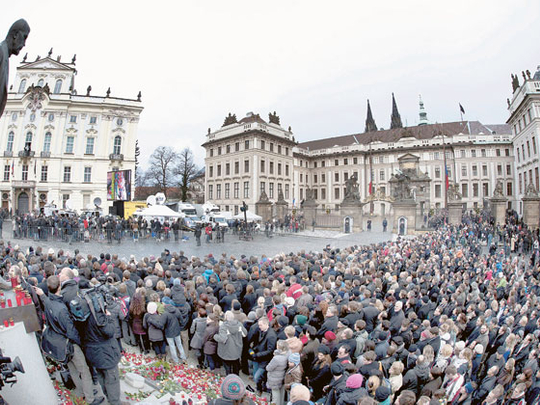
Prague: Czechs and world leaders paid emotional tribute to Vaclav Havel yesterday at a pomp-filled funeral ceremony, ending a week of public grief and nostalgia over the death of the dissident playwright who led the 1989 revolution that toppled four decades of communist rule.
Bells tolled from churches while a wailing siren brought the country to a standstill in a minute of silence for the nation's first democratically-elected president after the non-violent ‘Velvet Revolution'.
Havel's wife Dagmar, family members, friends and leaders from dozens of countries gathered at the towering, gothic St Vitus Cathedral which overlooks Prague. US secretary of state Hillary Clinton, French President Nicolas Sarkozy and Britain's Prime Minister David Cameron were among some 1,000 mourners who bowed their heads in front of the coffin draped in the Czech colours.
In a message read at the funeral by the Vatican's former diplomatic representative in Prague, Pope Benedict XVI praised Havel.
"Remembering how courageously Mr Havel defended human rights at a time when these were systematically denied to the people of your country, and paying tribute to his visionary leadership in forging a new democratic polity after the fall of the previous regime, I give thanks to God for the freedom that the people of the Czech Republic now enjoy," he said.
Private funeral
At the end of the ceremony, Havel's coffin was to be carried through the cathedral's Golden Gate to Prague's Strasnice crematorium for a private family funeral. The urn with Havel's ashes will be buried at his family's plot at the city's Vinohrady cemetery alongside his first wife, Olga, who died in 1996.
Havel, whose final term in office ended in 2003, died on Sunday morning in his sleep at his weekend home in the country's north.
The 75-year-old former chain-smoker had a history of chronic respiratory problems dating back to his time in prison.
Since his death, Czechs have gathered spontaneously to lay flowers and light candles at key historic sites such as the monument to the 1989 Velvet Revolution in downtown Prague, and at Wenceslas Square, where Havel once spoke before hundreds of thousands of people to express outrage at the repressive communist regime.
Similar scenes of remembrance played out across the country — in a show of emotion not seen since the 1937 funeral of Tomas Garrigue Masaryk, Czechoslovakia's first president after the nation was founded in 1918.
"Europe owes Vaclav Havel a profound debt," Cameron said before departing from London. "Havel led the Czech people out of tyranny ... and he helped bring freedom and democracy to our entire continent."
Czechs packed a nearby courtyard at Prague Castle and an adjacent square to watch the funeral ceremony on giant screens.
"He was our star, he gave us democracy," said Iva Buckova, 51, who had travelled from the western city of Plzen. "He led us through revolution. We came to see him for the last time."
Prague archbishop Dominik Duka, who spent time in jail with Havel under Communism, was leading the funeral mass. He was joined by Vatican envoy Giovanni Coppa and bishop Vaclav Maly, Havel's friend and fellow dissident. Poland's former president Lech Walesa — who led the anti-communist Solidarity movement — also attended.
Czech President Vaclav Klaus, who was Havel's political archrival, and two friends — Foreign Minister Karel Schwarzenberg and former US secretary of state Madeleine Albright — were to pay tribute to Havel at the cathedral, which dates to the 10th century and has not witnessed a state funeral since 1875.
The Czech Philharmonic Orchestra performed parts of Requiem by Czech composer Antonin Dvorak throughout the ceremony.
Braving the freezing cold, thousands of mourners have waited in long lines every day since Monday to file past Havel's coffin.
Several thousand people joined Havel's widow, relatives and friends in a sombre procession through the capital on Wednesday as Havel's body was transported to the Prague Castle. In his final years, Havel made only occasional public appearances.
Street named after revered leader
Gdansk — the birthplace of Poland's Solidarity movement — has renamed a street after Vaclav Havel to honour the Czech anti-communist icon deeply revered by Poles.
Officials in the city, the home of Poland's own anti-communist icon Lech Walesa, inaugurated Vaclav Havel Avenue yesterday, hours before the Czech playwright and president was laid to rest in his homeland.
Officials say they believe it's the first street worldwide to be named for Havel, who died on Sunday at the age of 75.
The news agency Pap says city council members voted unanimously on Thursday to rename the street 2 kilometres south of the city centre in Havel's honour.
Mayor Pawel Adamowicz said his city, a symbol of democratic transformation in Europe, wanted to honour "the Czech Walesa".












